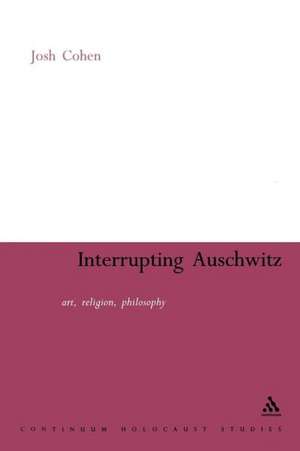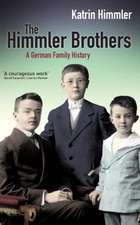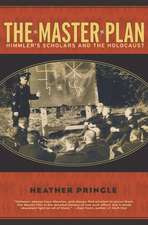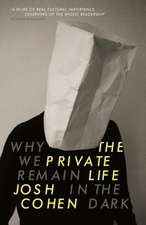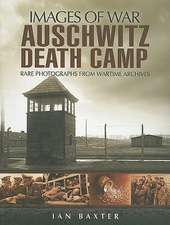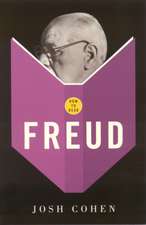Interrupting Auschwitz: Art, Religion, Philosophy
Autor Josh Cohenen Limba Engleză Paperback – 31 mai 2005
| Toate formatele și edițiile | Preț | Express |
|---|---|---|
| Paperback (1) | 256.12 lei 6-8 săpt. | |
| Bloomsbury Publishing – 31 mai 2005 | 256.12 lei 6-8 săpt. | |
| Hardback (1) | 1152.28 lei 6-8 săpt. | |
| Bloomsbury Publishing – 31 dec 2002 | 1152.28 lei 6-8 săpt. |
Preț: 256.12 lei
Nou
Puncte Express: 384
Preț estimativ în valută:
49.01€ • 53.22$ • 41.17£
49.01€ • 53.22$ • 41.17£
Carte tipărită la comandă
Livrare economică 22 aprilie-06 mai
Preluare comenzi: 021 569.72.76
Specificații
ISBN-13: 9780826477354
ISBN-10: 0826477356
Pagini: 192
Dimensiuni: 156 x 234 x 15 mm
Greutate: 0.3 kg
Editura: Bloomsbury Publishing
Colecția Continuum
Locul publicării:London, United Kingdom
ISBN-10: 0826477356
Pagini: 192
Dimensiuni: 156 x 234 x 15 mm
Greutate: 0.3 kg
Editura: Bloomsbury Publishing
Colecția Continuum
Locul publicării:London, United Kingdom
Cuprins
Chapter 1: The Interrupted Absolute: Art, Religion and the 'New Categorical Imperative'
Chapter 2: 'The Ever-Broken Promise of Happiness': Interrupting Art, or Adorno
Chapter 3: 'Absolute Insomnia': Interrupting Religion, or Levinas
Chapter 4: 'To Preserve the Question': Interrupting the Book, or Jabès
Conclusion: Sharing the Imperative
Chapter 2: 'The Ever-Broken Promise of Happiness': Interrupting Art, or Adorno
Chapter 3: 'Absolute Insomnia': Interrupting Religion, or Levinas
Chapter 4: 'To Preserve the Question': Interrupting the Book, or Jabès
Conclusion: Sharing the Imperative
Recenzii
"This is a singular book of enormous importance. Interrupting Auschwitz forges another way of thinking that is neither simple invention nor mere speculation. While there are many books that take the theme of Auschwitz, Cohen's work transcends any easy identification with holocaust studies. He knows the difficulties and therefore follows exacting and complex thought with great rigour, insisting that Auschwitz is a key problem for how we think."--Andrew Benjamin, Monash University
"Cohen underscores the necessity to remember history and write literature, or make art that can face-up to the terrible past and provide moral principles that could assure that Auschwitz will never happen again. Simultaneously the author is acutely aware of the impossibility of doing so. Rather than adopting Adorno's pessimism, Cohen reasons that the impossibility of this assurance places ethical thought in a state of continuous, endless incompleteness. Thus, closure is impossible, redemption is unattainable and our responsibility never ends. ... Rather than being understood in terms of a will to finality, the redemption is interpreted as an 'interruptive' thought, a refusal to bring thought to any point of completion. Very creatively, Cohen calls this ethical task 'interrupting' which signifies two distinct meanings, but both essential to our present-day thinking." -C. Oscar Jacob, Janus Head, 7.1, 2004
"Cohen underscores the necessity to remember history and write literature, or make art that can face-up to the terrible past and provide moral principles that could assure that Auschwitz will never happen again. Simultaneously the author is acutely aware of the impossibility of doing so. Rather than adopting Adorno's pessimism, Cohen reasons that the impossibility of this assurance places ethical thought in a state of continuous, endless incompleteness. Thus, closure is impossible, redemption is unattainable and our responsibility never ends. ... Rather than being understood in terms of a will to finality, the redemption is interpreted as an 'interruptive' thought, a refusal to bring thought to any point of completion. Very creatively, Cohen calls this ethical task 'interrupting' which signifies two distinct meanings, but both essential to our present-day thinking." -C. Oscar Jacob, Janus Head, 7.1, 2004
